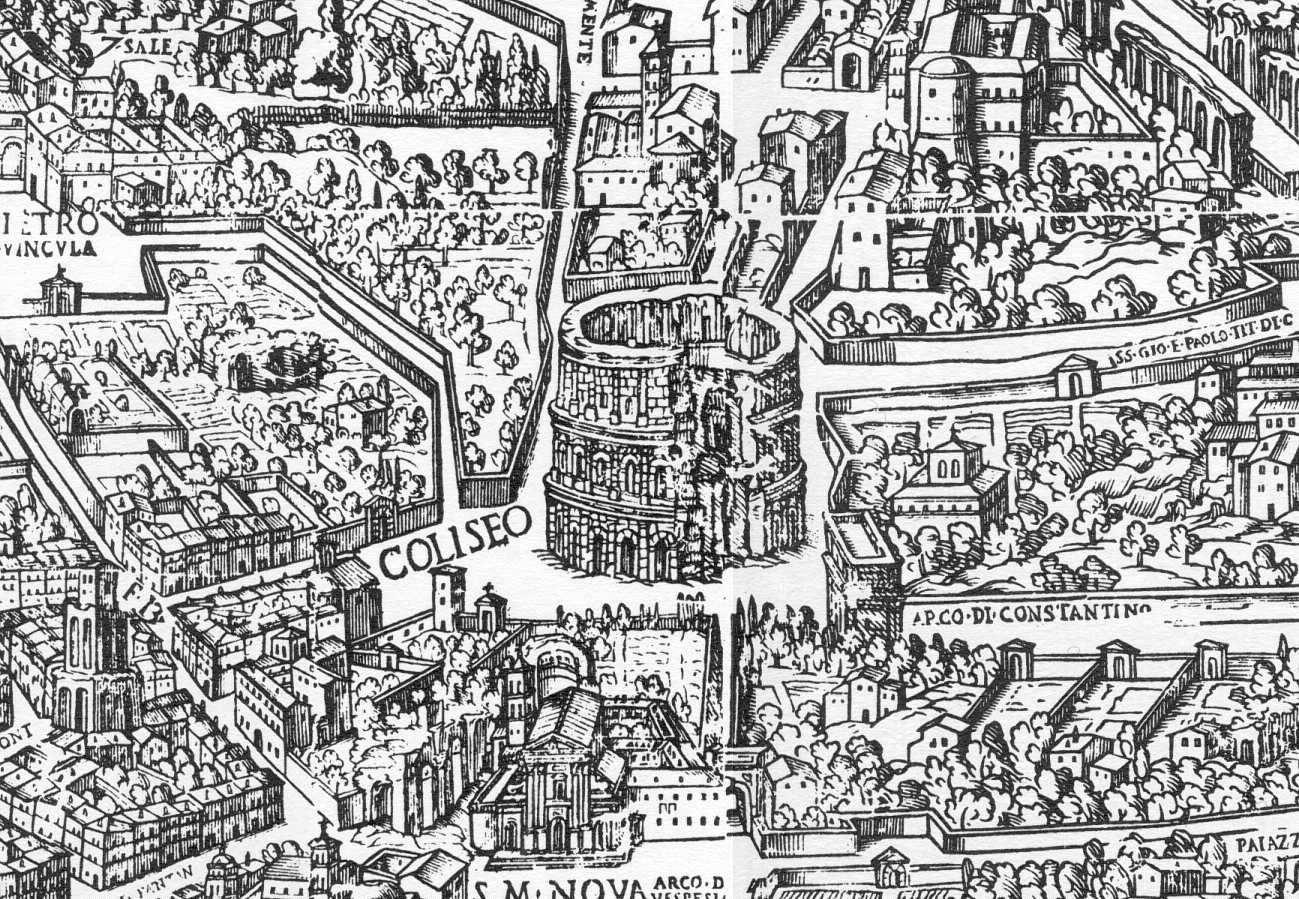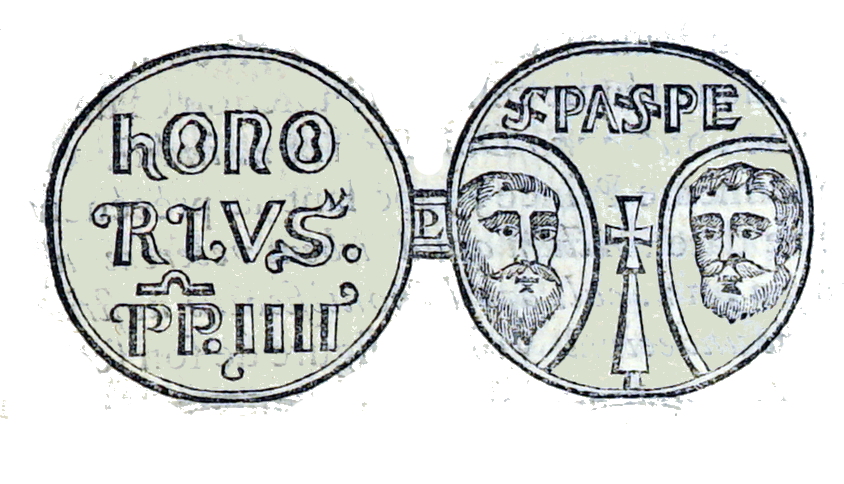|
Pope Honorius
Honorius has been the name of four Roman Catholic Popes and one Antipope An antipope ( la, antipapa) is a person who makes a significant and substantial attempt to occupy the position of Bishop of Rome and leader of the Catholic Church in opposition to the legitimately elected pope. At times between the 3rd and mid- .... The name is of Latin origin, derived from honōrō ("honor, respect"). * Pope Honorius I (625–638) **'' Antipope Honorius II (1061–1072)'' * Pope Honorius II (1124–1130) * Pope Honorius III (1216–1227) * Pope Honorius IV (1285–1287) {{disambiguation, tndis Honorius ... [...More Info...] [...Related Items...] OR: [Wikipedia] [Google] [Baidu] |
Regnal Name
A regnal name, or regnant name or reign name, is the name used by monarchs and popes during their reigns and, subsequently, historically. Since ancient times, some monarchs have chosen to use a different name from their original name when they accede to the monarchy. The regnal name is usually followed by a regnal number, written as a Roman numeral, to differentiate that monarch from others who have used the same name while ruling the same realm. In some cases, the monarch has more than one regnal name, but the regnal number is based on only one of those names, for example Charles X Gustav of Sweden. If a monarch reigns in more than one realm, they may carry different ordinals in each one, as some realms may have had different numbers of rulers of the same regnal name. For example, the same person was both King James VI of Scotland and King James I of England. The ordinal is not normally used for the first ruler of the name, but is used in historical references once the name i ... [...More Info...] [...Related Items...] OR: [Wikipedia] [Google] [Baidu] |
Pope
The pope ( la, papa, from el, πάππας, translit=pappas, 'father'), also known as supreme pontiff ( or ), Roman pontiff () or sovereign pontiff, is the bishop of Rome (or historically the patriarch of Rome), head of the worldwide Catholic Church, and has also served as the head of state or sovereign of the Papal States and later the Vatican City State since the eighth century. From a Catholic viewpoint, the primacy of the bishop of Rome is largely derived from his role as the apostolic successor to Saint Peter, to whom primacy was conferred by Jesus, who gave Peter the Keys of Heaven and the powers of "binding and loosing", naming him as the "rock" upon which the Church would be built. The current pope is Francis, who was elected on 13 March 2013. While his office is called the papacy, the jurisdiction of the episcopal see is called the Holy See. It is the Holy See that is the sovereign entity by international law headquartered in the distinctively independent Vatic ... [...More Info...] [...Related Items...] OR: [Wikipedia] [Google] [Baidu] |
Antipope
An antipope ( la, antipapa) is a person who makes a significant and substantial attempt to occupy the position of Bishop of Rome and leader of the Catholic Church in opposition to the legitimately elected pope. At times between the 3rd and mid-15th centuries, antipopes were supported by important factions within the Church itself and by secular rulers. Sometimes it was difficult to distinguish which of two claimants should be called pope and which antipope, as in the case of Pope Leo VIII and Pope Benedict V. Persons who merely claim to be pope and have few followers, such as the modern conclavist antipopes, are not classified with the historical antipopes. History Hippolytus of Rome (d. 235) is commonly considered to be the earliest antipope, as he headed a separate group within the Church in Rome against Pope Callixtus I. Hippolytus was reconciled to Callixtus's second successor, Pope Pontian, and both he and Pontian are honoured as saints by the Catholic Church with ... [...More Info...] [...Related Items...] OR: [Wikipedia] [Google] [Baidu] |
Latin
Latin (, or , ) is a classical language belonging to the Italic branch of the Indo-European languages. Latin was originally a dialect spoken in the lower Tiber area (then known as Latium) around present-day Rome, but through the power of the Roman Republic it became the dominant language in the Italian region and subsequently throughout the Roman Empire. Even after the fall of Western Rome, Latin remained the common language of international communication, science, scholarship and academia in Europe until well into the 18th century, when other regional vernaculars (including its own descendants, the Romance languages) supplanted it in common academic and political usage, and it eventually became a dead language in the modern linguistic definition. Latin is a highly inflected language, with three distinct genders (masculine, feminine, and neuter), six or seven noun cases (nominative, accusative, genitive, dative, ablative, and vocative), five declensions, four verb conjuga ... [...More Info...] [...Related Items...] OR: [Wikipedia] [Google] [Baidu] |
Pope Honorius I
Pope Honorius I (died 12 October 638) was the bishop of Rome from 27 October 625 to his death. He was active in spreading Christianity among Anglo-Saxons and attempted to convince the Celts to calculate Easter in the Roman fashion. He is chiefly remembered for his correspondence with Patriarch Sergius I of Constantinople over the latter's monothelite teachings. Honorius was posthumously anathematized, initially for subscribing to monothelitism, and later only for failing to end it. The anathema against Honorius I became one of the central arguments against the doctrine of papal infallibility. Early life Honorius was a rich aristocrat who came from Campania. His father was the consul Petronius. Nothing is known about Honorius I's career before he became pope on 27 October 625. He was consecrated only two days after the death of his predecessor, Boniface V. The vacancy was short probably because of the presence in Rome of Isaac the Armenian, who was empowered to confirm the ... [...More Info...] [...Related Items...] OR: [Wikipedia] [Google] [Baidu] |
Antipope Honorius II
Honorius II ( 1010 – 1072), born Pietro Cadalo (Latin ''Petrus Cadalus''), was an antipope from 1061 to 1072. He was born in the County of Verona, and became bishop of Parma in 1045. He died at Parma in 1072. Biography Cadalo was the son of the Lombard Ingone, the son of Wicard, the son of Atone. The family may have originated at Monselice (39 miles, 63 km east-southeast of Verona), and entered the military service of the Count of Verona. In 992, Wicard is on record as owning the castle of Calmano, when he acquired territory at Lonigo in the County of Verona. His son Ingone acquired a house and other property in Verona in 1005, and in 1014 he had risen to the post of Vicecomes (vice-count, viscount) of the city of Verona. Ingone was dead by 13 July 1028, on which date his sons and heirs, Cadalo, Erizo and Giovanni, purchased additional property. It is stated in the documents that Cadalo was already in the clerical state ("clericus"). Ecclesiastical career By 3 September ... [...More Info...] [...Related Items...] OR: [Wikipedia] [Google] [Baidu] |
Pope Honorius II
Pope Honorius II (9 February 1060 – 13 February 1130), born Lamberto Scannabecchi,Levillain, pg. 731 was head of the Catholic Church and ruler of the Papal States from 21 December 1124 to his death in 1130. Although from a humble background, his obvious intellect and outstanding abilities saw him promoted up through the ecclesiastical hierarchy. Attached to the Frangipani family of Rome, his election as pope was contested by a rival candidate, Celestine II, and force was used to guarantee his election. Honorius's pontificate was concerned with ensuring that the privileges the Roman Catholic Church had obtained through the Concordat of Worms were preserved and, if possible, extended. He was the first pope to confirm the election of the Holy Roman emperor. Distrustful of the traditional Benedictine order, he favoured new monastic orders, such as the Augustinians and the Cistercians, and sought to exercise more control over the larger monastic centres of Monte Cassino and Clun ... [...More Info...] [...Related Items...] OR: [Wikipedia] [Google] [Baidu] |
Pope Honorius III
Pope Honorius III (c. 1150 – 18 March 1227), born Cencio Savelli, was head of the Catholic Church and ruler of the Papal States from 18 July 1216 to his death. A canon at the Basilica di Santa Maria Maggiore, he came to hold a number of important administrative positions, including that of Camerlengo. In 1197, he became tutor to the young Frederick II. As pope, he worked to promote the Fifth Crusade, which had been planned under his predecessor, Innocent III. Honorius repeatedly exhorted King Andrew II of Hungary and Emperor Frederick II to fulfill their vows to participate. He also gave approval to the recently formed Dominican and Franciscan religious orders. Early work He was born in Rome as a son of Aimerico, a member of the Roman Savelli family. For a time canon at the church of Santa Maria Maggiore, he later became Camerlengo of the Holy Roman Church in December 5, 1189 and Cardinal Deacon of Santa Lucia in Silice on 20 February 1193. Under Pope Clement III and Pope Ce ... [...More Info...] [...Related Items...] OR: [Wikipedia] [Google] [Baidu] |
Pope Honorius IV
Pope Honorius IV (c. 1210 – 3 April 1287), born Giacomo Savelli, was head of the Catholic Church and ruler of the Papal States from 2 April 1285 to his death in 1287. During his pontificate he largely continued to pursue the pro-French political policy of his predecessor, Martin IV. Early career Giacomo Savelli was born in Rome into the rich and influential family of the Savelli. His father was Luca Savelli, who died as Senator of Rome in 1266. His mother Joanna belonged to the Aldobrandeschi family. He studied at the University of Paris, and held a prebend and a canonry at the cathedral of Châlons-sur-Marne. Later he obtained the benefice of rector at the church of Berton in the Diocese of Norwich in England, a nation he never visited. In 1261 he was created Cardinal Deacon of Santa Maria in Cosmedin by Pope Urban IV, who also appointed him papal prefect in Tuscany and captain of the papal army. Cardinal Savelli pursued a diplomatic career. Pope Clement IV sent him and ... [...More Info...] [...Related Items...] OR: [Wikipedia] [Google] [Baidu] |




